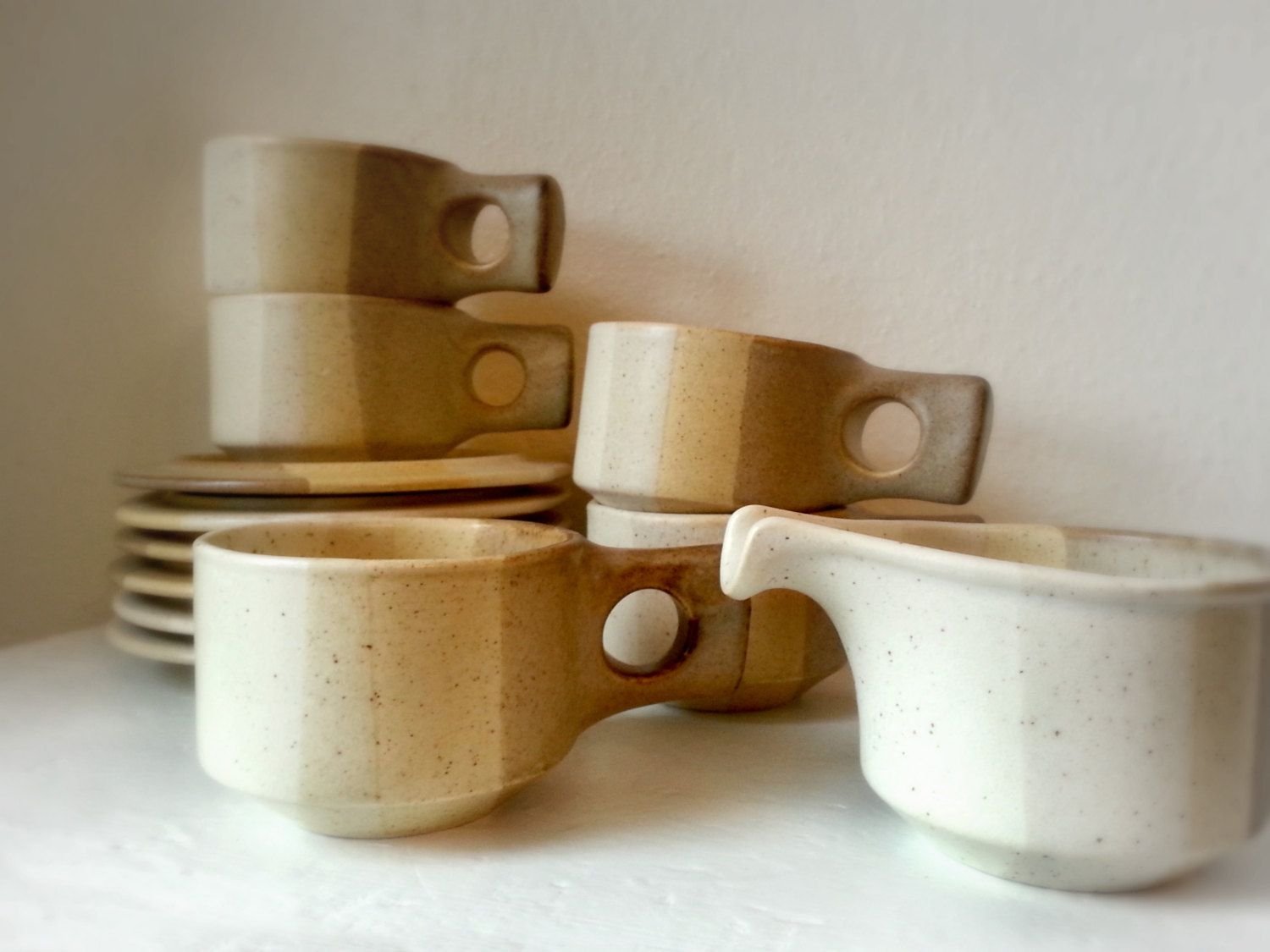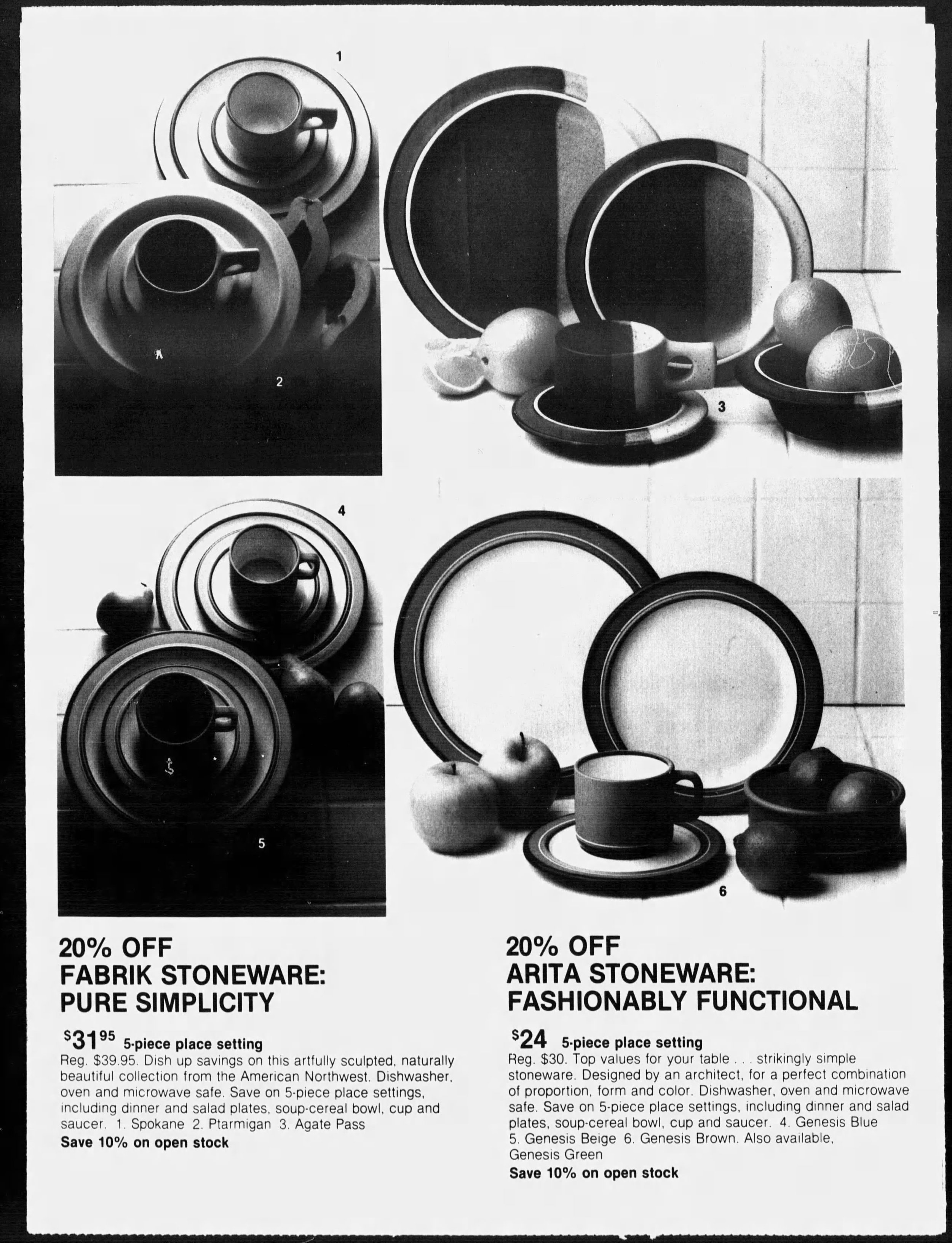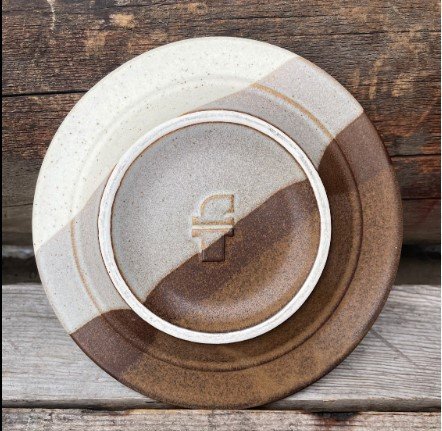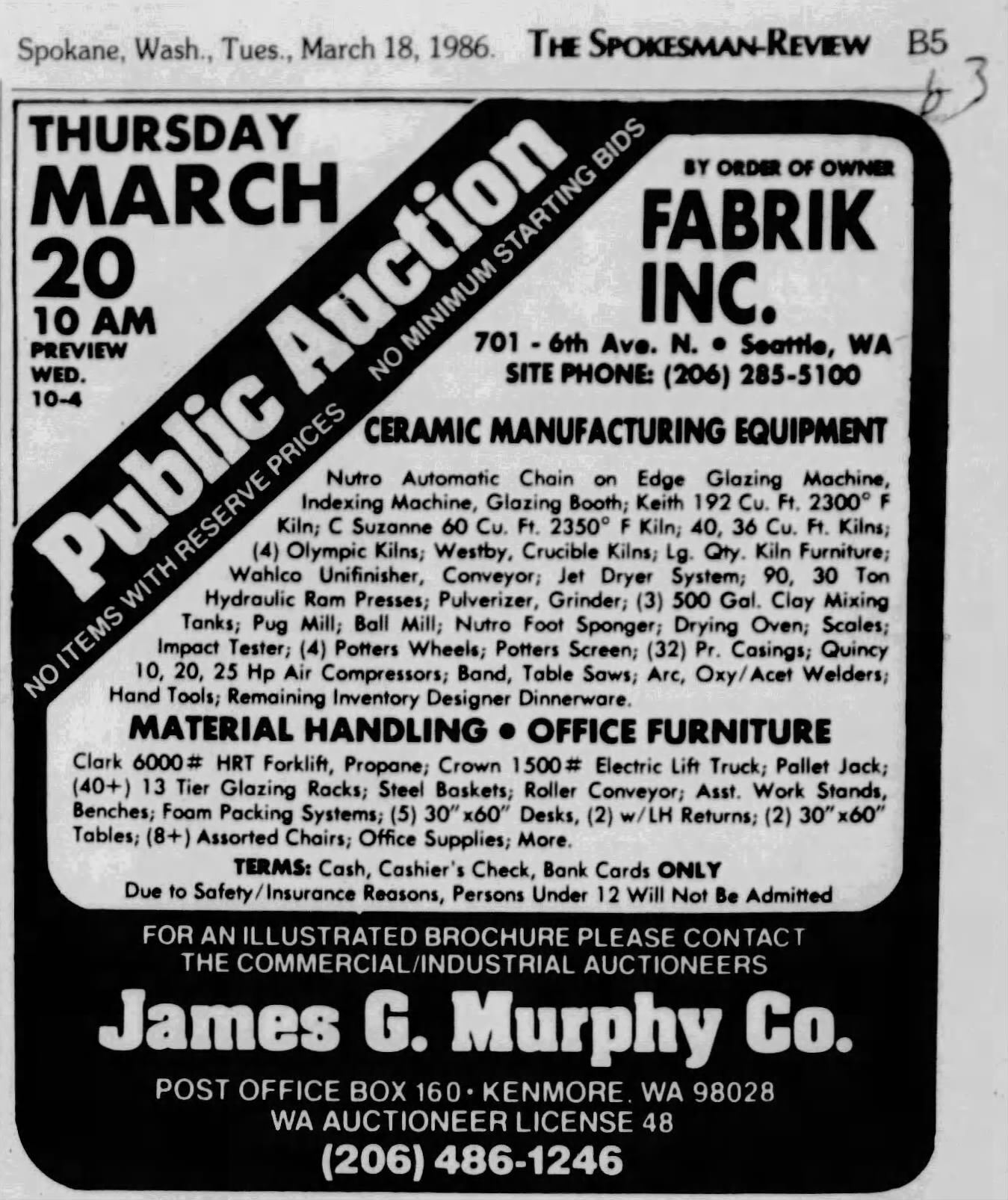Artist Highlight: Jim McBride
Salishan and Ptarmigan pattern dinnerware circa 1970s.
Salishan cups, saucers and creamer designed by Jim McBride for Fabrik.
While working as a pottery apprentice at Pottery Northwest, Jim McBride dreamed of opening his own factory. In the 1970s, he saved up enough money to purchase some secondhand mass-production equipment and opened his own doors under the name Fabrik at 701 6th Avenue, North Seattle, Washington.
Jim developed a distinctive dinnerware line, including plates, cups, and some serving pieces. The pieces are heavy, molded, and glazed with smooth matte finishes in simple overlap/interface patterns in varying combinations of earth tones. The hand-crafted work is known for its ram-pressed clay construction, outward slanted rims, and unusual handles. Plates stack into each other, creating a space-age flying saucer silhouette; salt and pepper sets are sculptural blocks with perfectly circular center-punched holes that pair nicely with the perfectly circular handles on the tea and coffee cups.
The artisan pieces are thick, substantial, and highly striking yet made to endure daily use and provide functionality to the modern home of the 1970s. Every piece was manufactured to be used in the oven, table, freezer, or microwave.
September 7th, 1980. Chicago Tribune.
To celebrate the home pride of the man and the company, all of the colorway names were regionally inspired.
Agate Pass; a high-current tidal strait in Puget Sound connecting Port Madison and mainland Kitsap County in Washington.
Verticle tri-color dipped design in deep brown, gray, and buff.
Salishan; a tribe indigenous to the PNW.
Vertical stripe in buff, cream, and beige.
Spokane; The name “Spokane” is often translated as “children of the sun,” most likely stemming from the name of a chief, Illim-Spokanee, first encountered by fur traders, whose name was translated as “Son of the Sun”. Spokane is now the name of a town 4 hours outside of Seattle.
Buff with brown fleck surface and brown banding.
Ptarmigan; A bird found in the Cascades from Wahstington’s Mt. Adams north to the U.S.-Canada border.
Plain body with brown flecks.
Foxfire; the phosphorescent light emitted by certain fungi on decaying timber.
Verticle stripe in grey, beige, and sandstone pink.
The company did manufacture custom work and some limited colorways, so some rare-to-find pieces are out there. Some known short-run colors of the original Agate pass vertical stripe designs are known to exist in raspberry and dusty pink, and in navy and cornflower blue. We also see a version of Ptarmigan in a brown body with speckles.
The unique style was met with great appreciation, and at its height, Fabrik could employ more than 15 artists to manufacture pieces for distribution nationwide. We know that there was a waterfront restaurant featuring Jim’s pottery near the factory and that The Bon’s in Southcenter’s china and gift department offered children’s own hands to be printed permanently on the stoneware to be hand finished and hand glazed for pick up as personal keepsakes in time for Fathers Day. Several shops provided Fabrik designs for wedding registries.
The raised “F” signature makers mark is found on the bottom of every Fabrik piece.
Fabrik logo on the underside of an Agate Pass pattern saucer.
Fabrik pieces appear in boutique catalogs and advertisements, which are heavily concentrated in the Pacific Northwest but also highlighted in a few key areas across the country. Regionally, they sold at The Country Corner in The Marketplace in Fairhaven Village. We also see Fabrik sold at all of The Bons locations. In Washington, we see Bon’s ads in Tacoma Mall, Bellingham, and Southcenter. Bon’s had locations throughout Montana, including cities like Missoula and Great Falls. Bon’s also listed Fabrik in Coos Bay, Oregon, and in Twin Falls and Boise, Idaho.
For cities outside of the PNW, we see several ads for Fabrik concentrated in the West but reaching key locations as far as the East Coast. In the West, we see listings at American Furniture and Jans Pan-tree in Albuquerque, New Mexico; La Boutique in Carlsbad, New Mexico; Tabletop in Tuscon, Arizona; and several Macy’s in Northern California. In middle America, we see listings for Yes, Virginia in Bismark, North Dakota; Marshall Fields in Chicago; Ben Simon’s in Omaha, Nebraska and Bin & Barrel, Corpus Christi, Texas. In the East, we see Elegant Accents in Tampa, Florida, and Scan Design at the Carriage Gate Center in Tallahassee, Florida. This is not a comprehensive list of locations where Fabrik was distributed but it gives collectors an idea of where to look to find more pieces by Jim McBride.
Concentration of known Fabrik ads published throughout history.
May 9th, 1975. The Bellingham Herald. Mary McBride makes an in store appearance.
After flourishing for many years, the Fabrik factory lost its way in the early 80s when Jim and his wife Mary, who had been running the business together, filed for divorce. Jim started experimenting with a bold new direction which did not resonate with customers. During this time, Jim created the unappealing American Quilt Collection (1984), whose name refers to a vibrant patchwork of different cultural and ethnic pockets residing within a larger community. It was the only colorway name that was not explicitly representative of the PNW. The collection was buff white with center-stamped navy blue geometric motifs and thin blue banding. Some of the newly developed pieces were unimaginative and tastelessly ornamented with handpainted words. The business rapidly deteriorated to the point of bankruptcy and officially shut its doors in the mid-1980s.
September 12th, 1982. The Journal Times. Ad for American Quilt by Fabrik.
We found the public auction advertisement from James G. Murphy Co. listed in the Spokesman-Review (Spokane, Washington) on March 18th, 1986. The listing provided details on the auction's contents as Fabrik cleared its operation. The auction included ceramic manufacturing equipment, everything from glazing machines to industrial kilns, hydraulic ram presses, pottery wheels, pulverizers, table saws, and the remaining dinnerware inventory. There is a potential that the purchaser of the remaining inventory and original molds tried to continue the brand. In a 1990s message board, one woman mentioned that she discovered a Fabrik website not managed by McBride on a search engine. This, of course, has long disappeared, so clearly, they had no success in continuing the Fabrik legacy.
Example of American Quilt by Fabrik circa 1980s.
Today, the timeless forms and impeccable hand-finished construction of the original 1970s Fabrik by Jim McBride designs are a favorite in functional mid-century collectibles. They are synonymous with Pacific Northwest mid-century design and continue to charm dinner guests across the country.










